- Home
- Brandon Sanderson
Skin Deep Page 12
Skin Deep Read online
Page 12
He frowned.
“Think about it,” I said. “The universe rolled its cosmic dice and ended up with you—a semi-random collection of atoms, synapses, and chemicals. Together, those create your personality, memories, and very existence. But if time continues forever, eventually that random collection will happened again. It may take hundreds of trillions of years, but it will come again. You. With your memories, your personality. In the context of infinity, kid, we will keep living, over and over.”
“I . . . don’t know how comforting that is, honestly. Even if it is true.”
“Really?” I asked. “Because I think it’s pretty amazing to consider. Anything that is possible is actually reality, given infinity. So, not only will you return, but your every iteration of possibility will play out. Sometimes you’ll be rich. Sometimes you’ll be poor. In fact, it’s plausible that because of a brain defect, sometime in the future you’ll have the memories you have now, even if in that future time you never lived those memories. So you’ll be you again, completely, and not because of some mystical nonsense—but because of simple mathematics. Even the smallest chance multiplied by infinity is, itself, infinite.”
I stood back up, then squatted down, looking him in the eyes and resting my hand on his shoulder. “Every variation of possibility, Dion. At some point, you—the same you, with the same thought processes—will be born to a wealthy family. Your parents will be killed, and you will decide to fight against injustice. It has happened. It will happen. You asked for comfort, Dion? Well, when the fear of death seizes you—when the dark thoughts come—you stare the darkness right back, and you tell it, ‘I will not listen to you, for I am infinite Batmans.’”
The kid blinked at me. “That . . . is the weirdest thing anyone has ever told me.”
I winked at him, then left him lost in thought and walked back to Audrey. I wasn’t sure how much of that I actually believed, but it was what had come out. Honestly, I don’t know that the universe could really handle everyone being infinite Batmans.
Perhaps the point of God was to prevent nonsense like that.
I took Audrey by the arm, speaking softly. “Audrey, focus on me.”
She looked at me, blinking. She’d been crying.
“We’re going to think, right now,” I told her. “We’re going to scrounge everything we know, and we’re going to come up with a way out of this.”
“I can’t—”
“You can. You’re part of me. You’re part of all of this; you can access my subconscious. You can fix this.”
She met my eyes, and some of my confidence seemed to transfer to her. She nodded sharply, and adopted a look of complete concentration. I smiled at her encouragingly.
The door to the building up above opened, then shut.
Come on, Audrey.
Zen’s footsteps rounded the building, then she began working on the lock down into the cellar.
Come on . . .
Audrey snapped her head up and looked at me. “I know where the body is.”
“The body?” I said. “Audrey, we’re supposed to be—”
“Zen’s company doesn’t have it,” Audrey said. “I3 doesn’t have it. The kid doesn’t know anything. I know where it is.”
The door down into the cellar opened. Light flooded in, revealing Zen silhouetted above. “Mister Leeds,” she said. “I need you to come with me so I can question you alone. It will only take a short time.”
I grew very cold.
20
“Oh hell,” Audrey said, backing away from me. “You need to do something! Don’t let her kill you.”
I turned to face Zen—a woman dressed in chic clothing, like she was the CFO of a Manhattan publishing company, not a paid assassin. She walked down the steps, feigning nonchalance. That attitude, mixed with the tension of the call above, told me all I needed to know.
She was going to eliminate me.
“They’re really willing to do this?” I asked her. “It will leave questions. Problems.”
“I don’t know what you’re talking about.” She got out her gun.
“Do we have to play this game, Zen?” I replied, frantically searching for a way to stall. “We both know what you’re up to. You’ll really follow through with orders that are so incompetent? It leaves you in danger. People will wonder where I’ve gone.”
“An equal number will be glad to have you out of their hair, I assume,” Zen said. She took out a suppressor, affixing it to her gun, all pretense gone now.
Audrey whimpered. To his credit, Dion stood up, unwilling to face death sitting down.
“You pushed them too hard, Mister Crazy,” Zen said. “They have it in their heads that you’re trying specifically to destroy them, and so they have responded as any bully does when shoved. They hit as hard as they can and hope it will solve the situation.” She raised the gun. “As for me, I can take care of myself. But thank you for your concern.”
I stared down the barrel of that gun, sweating, panicking. No hope, no plan, no aspects . . .
But she didn’t know that.
“They’re around you,” I whispered.
Zen hesitated.
“Some people theorize,” I said, “that the ones I see are ghosts. If you’ve read about me, then you’ll know. I do things I shouldn’t be able to. Know things I shouldn’t know. Because I have help.”
“You’re just a genius,” she said, but her eye twitched to the side. Yes, she’d read about me. Deeply, if she knew how to drive off without my aspects.
And nobody could dig into my world without coming away a little bit . . . touched.
“They’ve caught up to us,” I said. “They stand on the steps behind you. Can you feel them there, Zen? Watching you? Hands at your neck? What will you do with them if you remove me? Will you live with my spirits stalking you for the rest of your life?”
She set her jaw, and seemed as if she was trying very, very hard not to look over her shoulder. Was this actually working?
Zen took a deep breath. “They won’t be the only spirits that haunt me, Leeds,” she whispered. “If there is a hell, I earned my place in it long ago.”
“So you say,” I replied. “Of course, what you really should be wondering is this: I’m a genius. I know things I shouldn’t. So why have I placed us here, right now? Why is it that I want you right there?”
“I . . .” She held the gun on me. A cool breeze blew in down around her, rustling the lips of old potato sacks.
My cell phone chirped in her pocket.
Zen practically jumped to the ceiling. She cursed, sweating, and rested her hand on the pocket. She thrust the gun at me and fired. Wild. The support beam beside me popped with exploding bits of wood. Dion dove for cover.
Zen—eyes so wide, I could see the whites all around her pupils—held the gun in a trembling hand, focusing on me.
“Check the phone, Zen,” I said.
She didn’t move.
No! It couldn’t go this way. So close! She had to—
Another phone rang. Hers this time, I assumed, buzzing in her other pocket. Zen wavered. I met her stare. In that moment, one of the two of us was mad, insane, on the edge.
And it wasn’t the crazy guy.
Her phone stopped ringing. A text followed. We waited, facing one another in the cold cellar until, at long last, Zen reached down and took out her phone. She stared at it for a few moments. Then she laughed a barking laugh. She backed up, placing a call, and had a whispered conversation.
Letting out what had to be the biggest breath of my life, I walked to Dion and helped him to his feet. He looked up at Zen, who laughed again, this time louder.
“What’s going on?” Dion asked.
“We’re safe,” I said. “Isn’t that right, Zen?”
She giggled wildly. Then she hung up and looked right at me. “Whatever you say, sir.”
“. . . ‘Sir’?” Dion asked.
“Exeltec was on unstable footing,” I said. “I released
rumors that it was involved in a federal investigation, and had Yol push all the right buttons economically.”
“To make them desperate?” Dion asked.
“To crash the company,” I said, walking back to Zen, passing a flummoxed Audrey. “So I could afford to buy it. Yol was supposed to do that part, but only got halfway done. I had to have Wilson do the rest, calling the various Exeltec investors and buying them out.” I proffered my hand to Zen. She gave me my phone.
“So . . .” Dion said.
“So I now own a sixty percent stake in the company,” I said, checking the text from Wilson. “And have voted myself president. That makes me Zen’s boss.”
“Sir,” she said. She was doing a good job of regaining her composure, but I could see a wildness in the way her hands still trembled, the way she stood with her expression too stiff.
“Wait,” Dion said. “You just defeated an assassin with a hostile takeover?”
“I use the cards dealt to me. Probably wasn’t particularly hostile, though—I suspect that everyone involved was all too eager to jump ship.”
“You realize, of course,” Zen said smoothly, “that I was never actually going to shoot you. I was just supposed to make you worried so you’d share information.”
“Of course.” That would be the official line, to protect her and Exeltec from attempted murder charges. My buyout agreement would include provisions to prevent me from taking action against them.
I pocketed my phone, took my gun back from Zen, and nodded to Audrey. “Let’s go collect that body.”
21
We found Mrs. Maheras in the garden still. She knelt there, planting, nurturing, tending.
I walked up, and from the way she glanced at me, I suspected she realized that her secret was out. Still, I knelt down beside her, then handed over a carton of half-grown flowers when she motioned toward them.
Sirens sounded in the distance.
“Was that necessary?” she asked, not looking up.
“Sorry,” I said. “But yes.” I’d sent a text to Yol, knowing the feds would get it first. Behind me, Audrey, Tobias, Ivy, and a downcast J.C. stepped up to us. They cast shadows, to my eyes, in the fading light, and blocked my view of Dion standing just behind. We’d found them all walking along the road, miles from Zen’s holding place, trying to reach me.
I was tired. Man, was I tired. Sometimes, in the heat of it all, you can forget. But when the tension ends, it comes crashing down.
“I should have seen it,” Ivy said again, arms folded. “I should have. Most Orthodox branches are pointedly against cremation. They see it as desecration of the body, which is to await resurrection.”
We had been so focused on the information in Panos’s cells that we didn’t stop to think there might be other reasons entirely that someone would want to take the corpse. Reasons so powerful that it would convince an otherwise law-abiding woman and her priest to pull a heist.
In a way, I was very impressed. “You were a cleaning lady when you were younger,” I said. “I should have asked Dion more about your life, your job. He mentioned hard labor, a life spent supporting him and his brother. I didn’t ask what you’d done.”
She continued planting flowers upon her son’s grave, hidden in the garden.
“You imitated the cleaning lady who worked at the morgue,” I said. “You paid her off, I assume, and went in her place—after having the priest place tape on the door. It really was him, not an impostor. Together, you went to extremes to protect your son’s corpse from cremation.”
“What gave me away?” Mrs. Maheras asked as the sirens drew closer.
“You followed the real cleaning lady’s patterns exactly,” I said. “Too exactly. You cleaned the bathroom, then signed your name on the sheet hanging on the door, to prove it had been done.”
“I practiced Lilia’s signature exactly!” Mrs. Maheras said, looking at me for the first time.
“Yes,” I said, holding up one of the slips of paper with scriptures on them that she put in her son’s pockets. “But you wrote the cleaning time on that sheet as well, and you didn’t practice imitating Lilia’s numbers.”
“You have a very distinctive zero,” Audrey explained, looking supremely smug. Cryptography hadn’t cracked this case after all. It had just required some good, old-fashioned handwriting analysis.
Mrs. Maheras sighed, then placed her spade into the dirt and bowed her head, offering a silent prayer. I bowed my head as well, as did Ivy and J.C. Tobias refrained.
“So you’ll take him again,” Mrs. Maheras whispered, once she had finished. She looked at the ground before her, now planted with flowers and tomatoes.
“Yes,” I said, climbing to my feet and dusting off my knees. “But at the very least, you’re unlikely to be in too much trouble for what you did. The government doesn’t recognize a body as property, so what you did wasn’t actually theft.”
“A cold comfort,” she muttered. “They’ll still take him, and they’ll burn him.”
“True,” I said idly. “Of course, who knows what secrets your son had hidden in his body? He’d been splicing secret information into his very DNA, and he might have hidden all kinds of things in there. The right implication at the right time might prod the government into a very, very long search.”
She looked up at me.
“Scientists disagree on how many cells there are in the human body,” I explained. “Somewhere in the trillions, easily. Perhaps many more than that. Could take decades upon decades to search them all, something I doubt the government will want to do. However, if they think there might be something important, they could likely set the body into storage just in case they need to do a thorough search at some point.
“It wouldn’t be a proper burial, as you want—but it also wouldn’t be cremation. I believe the church does make provisions for people donating organs to help others? Perhaps it’s best to just consider it in that light.”
Mrs. Maheras seemed thoughtful. I left her then, and Dion stepped forward to comfort her. My suggestions did seem to have made a difference, which baffled me. I’d have rather seen a family member cremated than spend forever being frozen. However, as I reached the building and looked back, I found that Mrs. Maheras seemed to have perked up visibly.
“You were right,” I told Ivy.
“Have I ever not been right?”
“I don’t know about that,” J.C. said. “But you do make some really bad relationship choices sometimes.”
We all looked at him, and he blushed immediately.
“I was talking about her dumping me,” he protested. “Not picking me in the first place!”
I smiled, leading the way into the kitchen. I was just glad to have them back. I walked down the little hallway lined with pictures, toward the front door. I’d want to meet the feds when they arrived.
Then I stopped. “There’s a bare patch on the wall. It looks so odd. Every surface, desk, and wall in this place is covered with kitsch. Except here.” I pointed at the pictures of the family, then two pictures of saints. Two spots, empty save for little nails. Ivy had said that Mrs. Maheras had probably taken down the picture of Panos’s patron saint in preparation for his funeral.
“Ivy,” I said, “would you say it’s safe to assume that Panos knew if he died, this picture would be removed and placed with his corpse?”
We looked at each other. Then I reached up and pulled on the nail. It resisted in an odd fashion. I yanked harder, and the nail came out—but had a knob and string tied around the back end.
Behind the wall, something clicked.
I looked at the aspects, suddenly worried, until the wall’s nearby light switch—plate behind it and all—rotated forward like a hidden cup holder in a car’s dashboard. The portion that had been hidden inside the wall had LED lights blinking on the sides.
“Well I’ll be damned,” J.C. said. “The kid was right.”
“Language,” Ivy mumbled, looking closely at the contraption.
/>
“What happened to the future curses?” Audrey said. “I kind of liked those.”
“I realized something,” J.C. said. “I can’t be an Interdimensional Time Ranger. Because if I am, that means all of you are too. And that’s just a little too silly for me to accept.”
I reached into the holder that had come out and extracted a thumb drive. Written on it, with a label maker, were a few words.
“1 Kings 19:11–12,” I read.
“And He said,” Ivy quoted in a quiet voice, “Go forth, and stand upon the mount before the Lord. And behold, the Lord passed by, and a great and strong wind rent the mountains and broke in pieces the rocks before the Lord, but the Lord was not in the wind; and after the wind an earthquake, but the Lord was not in the earthquake. And after the earthquake a fire, but the Lord was not in the fire; and after the fire a still small voice.”
I looked at my aspects as a fist pounded on the door. Then I pocketed the thumb drive and pushed the holder back into the wall before going to meet with the feds.
Epilogue
Four days later, I stood alone in the White Room. Tobias had covered over the hole in the ceiling, as he’d promised. The place was refreshingly blank.
Was this what I would be, without my aspects? Blank? I’d certainly felt that way while being held by Zen. I’d barely been able to do anything to save myself. No plans, no escaping. Just some stalling. Ivy had sometimes wondered if I was growing good enough on my own that I eventually wouldn’t need her or the others any longer.
From what had happened to me when I’d lost them, I figured that day—if it ever came—was a long, long way off.
The door cracked open. Audrey slipped in, wearing a blue one-piece swimsuit. She trotted up to me and delivered a sheet of paper. “Have to go catch a pool party. But I did finish solving this. Wasn’t too hard, once we had the key.”
On the thumb drive, we’d found two things. The first was the anticipated key to unlocking the data on Panos’s body. The body had been seized by the government, and I’d convinced them to put it on ice for the foreseeable future. After all, there might be very, very important data on it, and someday the key might turn up.

 Steelheart
Steelheart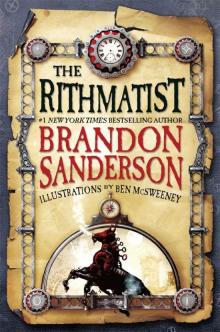 The Rithmatist
The Rithmatist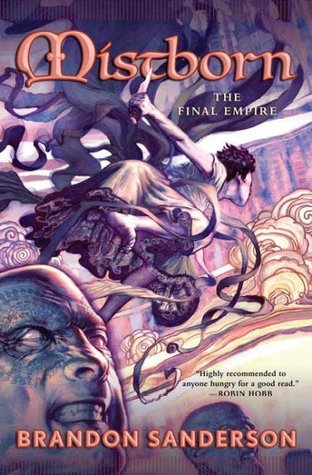 Mistborn: The Final Empire
Mistborn: The Final Empire Oathbringer
Oathbringer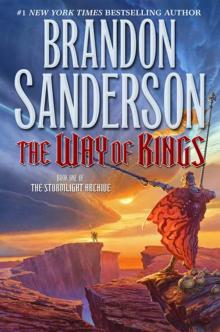 The Way of Kings
The Way of Kings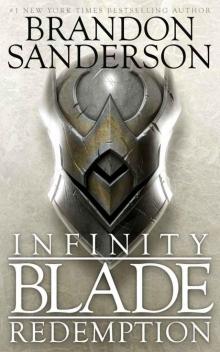 Redemption
Redemption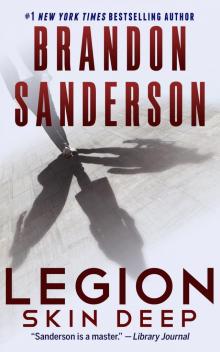 Skin Deep
Skin Deep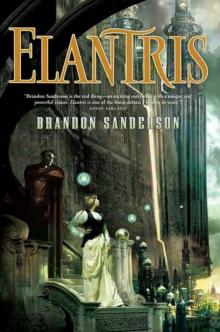 Elantris
Elantris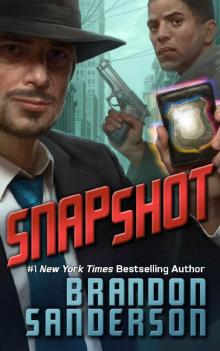 Snapshot
Snapshot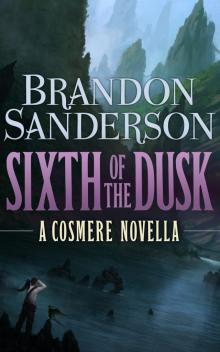 Sixth of the Dusk (Cosmere)
Sixth of the Dusk (Cosmere)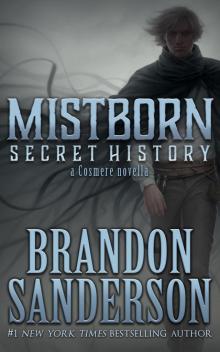 Mistborn: Secret History
Mistborn: Secret History White Sand, Volume 1
White Sand, Volume 1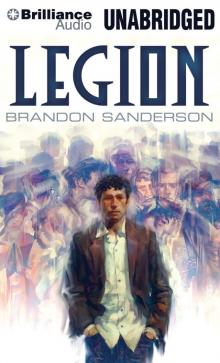 Legion
Legion The Well of Ascension
The Well of Ascension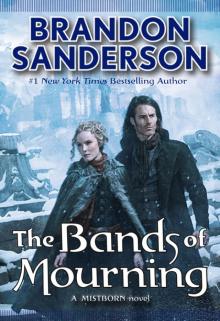 The Bands of Mourning
The Bands of Mourning Words of Radiance
Words of Radiance The Hero of Ages
The Hero of Ages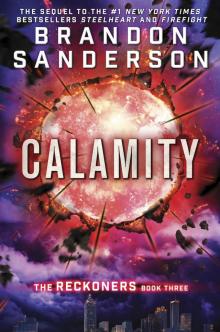 Calamity
Calamity Alcatraz Versus the Scrivener's Bones
Alcatraz Versus the Scrivener's Bones The Alloy of Law
The Alloy of Law The Emperors Soul
The Emperors Soul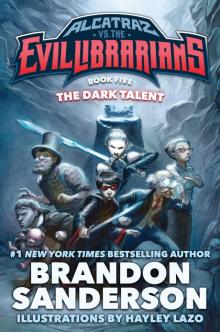 The Dark Talent
The Dark Talent The Gathering Storm
The Gathering Storm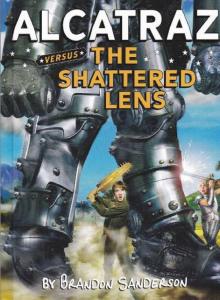 Alcatraz Versus the Shattered Lens
Alcatraz Versus the Shattered Lens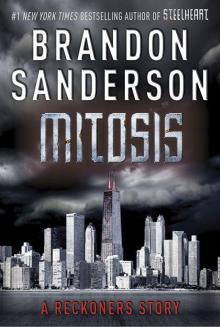 Mitosis
Mitosis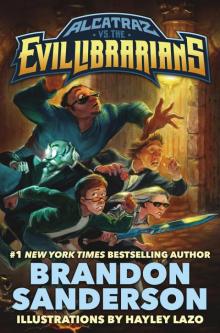 Alcatraz vs. The Evil Librarians
Alcatraz vs. The Evil Librarians Rhythm of War (9781429952040)
Rhythm of War (9781429952040)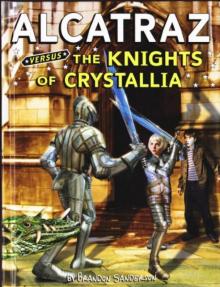 Alcatraz Versus the Knights of Crystallia
Alcatraz Versus the Knights of Crystallia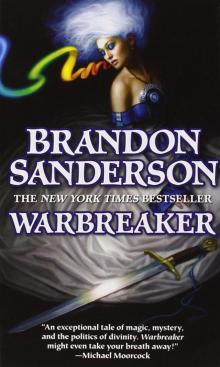 Warbreaker
Warbreaker Firstborn
Firstborn Starsight
Starsight Edgedancer
Edgedancer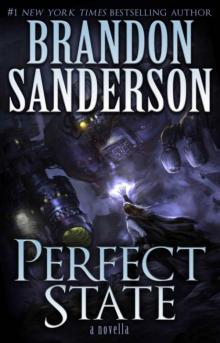 Perfect State
Perfect State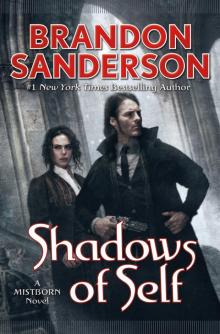 Shadows of Self
Shadows of Self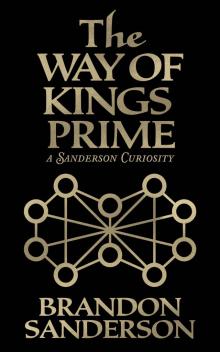 The Way of Kings Prime
The Way of Kings Prime Starsight (US)
Starsight (US) Shadows for Silence in the Forests of Hell
Shadows for Silence in the Forests of Hell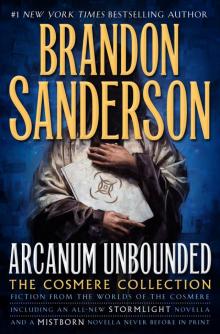 Arcanum Unbounded: The Cosmere Collection
Arcanum Unbounded: The Cosmere Collection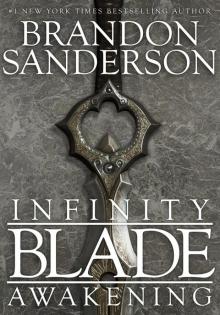 Awakening
Awakening Firefight
Firefight Dawnshard
Dawnshard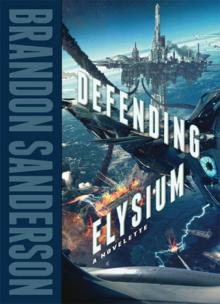 Defending Elysium
Defending Elysium White Sand
White Sand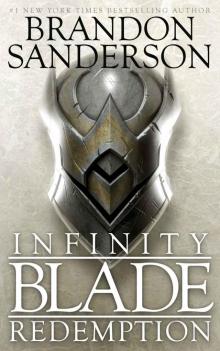 Infinity Blade: Redemption
Infinity Blade: Redemption The Final Empire
The Final Empire Skyward
Skyward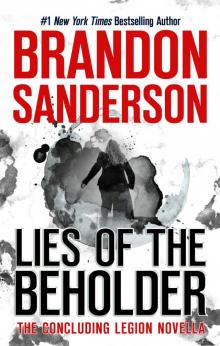 Lies of the Beholder
Lies of the Beholder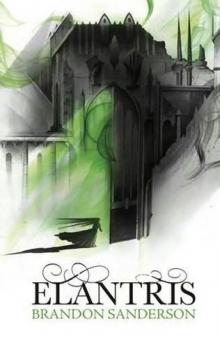 Elantris e-1
Elantris e-1 Steelheart r-1
Steelheart r-1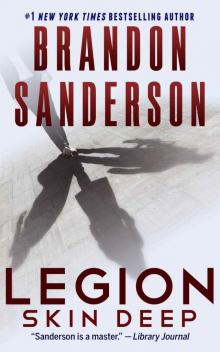 Legion: Skin Deep
Legion: Skin Deep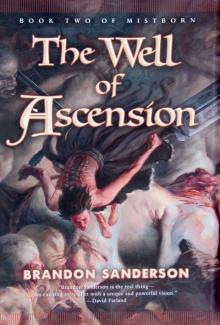 Well of Ascension
Well of Ascension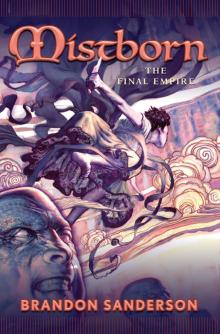 Mistborn
Mistborn Alcatraz versus the Evil Librarians
Alcatraz versus the Evil Librarians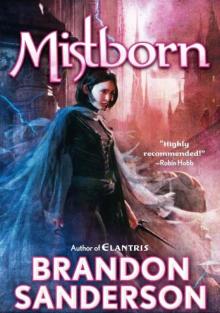 The Final Empire m-1
The Final Empire m-1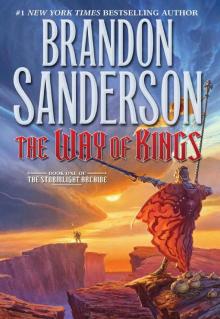 The Way of Kings (Stormlight Archive, The)
The Way of Kings (Stormlight Archive, The)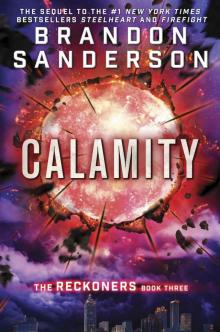 Calamity (The Reckoners)
Calamity (The Reckoners)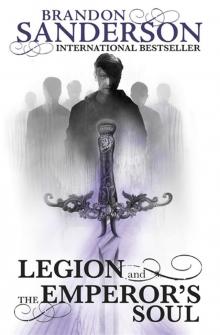 Legion and the Emperor's Soul
Legion and the Emperor's Soul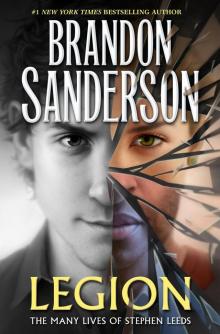 Legion: The Many Lives of Stephen Leeds
Legion: The Many Lives of Stephen Leeds The Mistborn Trilogy
The Mistborn Trilogy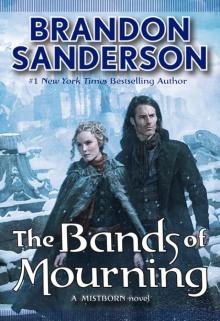 Bands of Mourning
Bands of Mourning Alcatraz
Alcatraz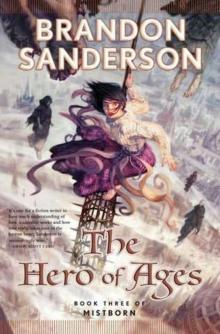 The Hero of Ages m-3
The Hero of Ages m-3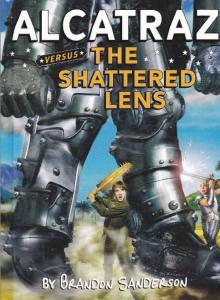 Alcatraz vs. the Shattered Lens
Alcatraz vs. the Shattered Lens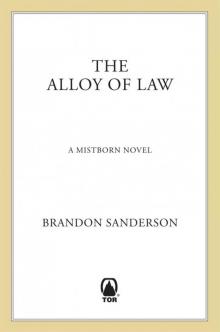 The Alloy of Law: A Mistborn Novel
The Alloy of Law: A Mistborn Novel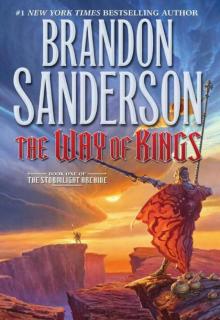 The Way of Kings sa-1
The Way of Kings sa-1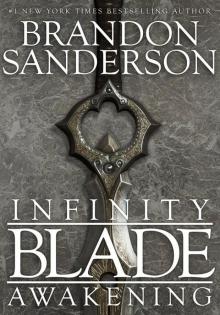 Infinity Blade: Awakening
Infinity Blade: Awakening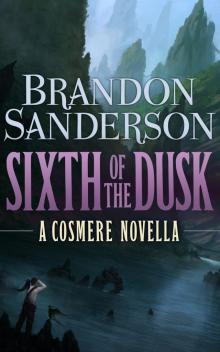 Sixth of the Dusk
Sixth of the Dusk The Stormlight Archive
The Stormlight Archive The Aether of Night
The Aether of Night